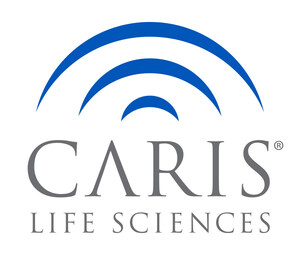Caris Life Sciences Paired Tumor Data Identifies Key Driver Mutations and Confirms Tumor Heterogeneity in High-Grade Glioma Samples
Paired Tumor Research in Glioma, Breast Cancer and Epithelial Ovarian Carcinoma Guides Clinical Application of Comprehensive Tumor Profiling
IRVING, Texas, May 30, 2015 /PRNewswire/ -- Caris Life Sciences® today announced the presentation of data from a study in which researchers identified biomarker changes, including key driver mutations, in 89% of metachronous paired glioma tumors, indicating changes in response to therapy as the disease progresses. The study observing 19 patients was a subset of a larger study analyzing 1,245 glioma samples that confirmed molecular heterogeneity of the cancer. These data utilizing Caris Molecular Intelligence®, the company's panomic comprehensive tumor profiling service, are being presented at the 2015 annual meeting of the American Society of Clinical Oncology (ASCO) in Chicago, Ill.
"Paired data research is critically important to understanding disease progression and predicting treatment resistance, which is a type of analysis that has not been previously reported in high-grade gliomas," said lead author of the study, Joanne Xiu, Ph.D., Research Scientist and Molecular Science Liaison at Caris Life Sciences. "The high-frequency of mutations observed over time explains why high-grade gliomas can become resistant to new therapies, demonstrating the need for a re-biopsy for tumor profiling to direct the next line of therapy."
In this study (abstract #2058), paired tumors from 19 patients (18 glioblastoma [GBM] and one grade III) were taken at an average of 469 days apart. Researchers observed that 89% (17 pairs) had one or more biomarker changes over time. The data showed that 23% (3/13) lost MGMT-methylation (MGMT-ME), indicating acquired resistance to temozolomide. Three tumor pairs also showed acquired EGFR mutations or amplification. In the cohort observing 1,245 glioma samples, which included GBM and phase II-III tumors, researchers observed epidermal growth factor receptor variant III (EGFRvIII) exclusively in GBM, and MGMT ME in 47% of all tumors. PD-L1 expression on tumor cells was seen in 27% and was more common in tumors without MGMT ME (36% vs. 18%). PD-1 expression on tumor-infiltrating lymphocytes was seen in 48% and was higher in GBM than grade II-III.
"These results, from a large cohort of glioma samples, provide us with insights into the biology of the disease, confirming the heterogeneity of the cancer," said Santosh Kesari, M.D., Ph.D., Director of Neuro-oncology at Moores UCSD Cancer Center and author on the study. "Utilizing comprehensive tumor profiling can inform physicians on how to make better treatment decisions for patients based on the unique characteristics of their tumor."
In a second paired tumor study (abstract #5545), researchers used Caris Molecular Intelligence to retrospectively analyze sequencing results from 83 epithelial ovarian carcinoma (EOC) samples arising from different sites in an attempt to better understand how to apply NGS in the management of the disease. The samples were collected and observed from 43 to 2,793 days apart. The study results showed that 85.5% of the mutations showed complete agreement between the first and subsequent sample. Only 12 paired samples showed disagreement in gene results, and those differences were only observed in one gene. The authors conclude that use of molecular profiling in EOC offers a more comprehensive approach to identifying additional therapeutic options and should be studied further.
In a third paired tumor study (abstract #567), researchers evaluated 337 cases with >1 asynchronous primary/metastatic breast cancer (BC) molecular profiles and 40 cases with >1 synchronous molecular profiles. At the same institution, researchers evaluated the samples for differences in ER, PR, and HER2 status in the same or contralateral breast, and in primary vs. locally recurrent or metastatic BCs. The author concludes that as a result of the discordant results, tumor profiling should take place at diagnosis and at each time of recurrence/progression in the cancer continuum to more accurately reflect the tumor profile at the time of treatment.
In a final paired tumor study (abstract #558), researchers utilized comprehensive molecular profiling to analyze breast cancers (BCs) at a single institution for differences in clonal populations within the same breast, bilateral synchronous BCs, and/or within primary and paired locally recurrent or metastatic tumors. Gene alterations (GAs), identified by NGS, were compared in 9 synchronous BCs and 48 primary/recurrent paired BCs. Estrogen receptor (ER), progesterone receptor (PR), androgen receptor (AR), were evaluated by Immunohistochemistry (IHC) and HER2 was evaluated by IHC and in situ hybridization (ISH). Researchers identified that common GAs differ in both synchronous primary BCs and in paired primary/metastatic tissues and such discordance could influence treatment recommendations. These findings highlight the molecular evolution of BC and the importance of evaluating predictive markers of treatment benefit both in synchronous and metastatic BCs.
About Caris Life Sciences®
Caris Life Sciences® is a leading biotechnology company focused on fulfilling the promise of precision medicine through quality and innovation. Caris Molecular Intelligence®, the company's healthcare information and comprehensive tumor profiling service with more than 70,000 patients profiled, provides oncologists with the most clinically actionable treatment options available to personalize cancer care today. Using a variety of advanced profiling technologies to assess relevant biological changes in each patient's tumor, Caris Molecular Intelligence connects biomarker data generated from a tumor with biomarker-drug associations supported by evidence in the relevant clinical literature. Since 2009, Caris has tracked clinical and outcome data for certain patients undergoing tumor molecular profiling, for which Caris has observed that patients treated with drugs consistent with their molecular profile show a significant increase in overall survival. The company is developing its Carisome® TOP™ technology, a revolutionary and proprietary blood-based platform for the development of novel therapeutics, drug delivery and drug target identification. The technology is also being developed for diagnosis, prognosis, and theranosis of cancer and other complex diseases. Headquartered in Irving, Texas, Caris Life Sciences offers services throughout Europe, the U.S., Australia and other international markets. To learn more, please visit www.CarisLifeSciences.com.
SOURCE Caris Life Sciences
Related Links
http://www.CarisLifeSciences.com
WANT YOUR COMPANY'S NEWS FEATURED ON PRNEWSWIRE.COM?
Newsrooms &
Influencers
Digital Media
Outlets
Journalists
Opted In





Share this article